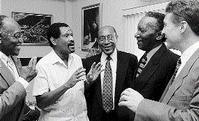Ross Sheil, Staff Reporter

Dr. Henry Lowe (centre) and Dr. Joseph Bryant (second right), of the University of Maryland Institute of Human Virology (IHV), discuss their new cancer breakthrough, at Eden Gardens Wellness Centre on Lady Musgrave Road, in St. Andrew, yesterday, with Professor Errol Morrison, president of Jamaica Blue Cross (left); Dr. Trevor McCarthy, senior medical officer at Kingston Public Hospital (second left) and Dr. Bryant's patent attorney Royal Craig (right), from Baltimore law firm Ober Kaler. - Rudolph Brown/Chief Photographer
Government wants to partner with, as well as raise funds from the local private sector to fund further research into the Jamaican cancer treatment breakthrough which uses extracts from two plants endemic to the island, said Phillip Paulwell, Minister of Industry, Technology, Energy and Commerce, yesterday.
His announcement was welcomed during the public presentation of the research findings, at the Eden Gardens Wellness Centre in St. Andrew, with the scientific community anticipating further investment in local research.
Jamaican biochemist Dr. Henry Lowe, who identified the plants, said the drug could take a further US$10 million (approximately J$660 million) to develop provided the clinical trials are carried out in Jamaica.
Testing
This, he said, would be cheaper than in the United States. His research partner Joseph Bryant, laboratory animal veterinarian at the University of Maryland Institute of Human Virology (IHV), carried out the testing on five cancers in test tubes and on transgenic mice - genetically modified to carry human DNA.
Their findings show that the extracts perform as well as Taxol, an existing chemotherapy drug. However, unlike Taxol, the extracts have so far not shown toxicity or an increasing resistance by cancer tumours.
Dr. Lowe said he was asked by his former teacher, Professor Gerald Lalor of the University of the West Indies (UWI), Mona, what he wanted to achieve from the presentation.
"Money and support!" he recounted.
He said the research had cost US$1 million (approximately J$66 million) so far, financed in part by his own means, as well as through support from the Environmental Health Foundation, which he chairs, and Dr. Bryant's laboratory.
"It is going to be an expensive proposition, literally millions of (U.S.) dollars, but government is committed to being a partner in this because we recognise the tremendous potential for the country," Mr. Paulwell told The Gleaner.
Funding
He added that the Planning Institute of Jamaica was also committed to increasing funding from international donors for local research.
Apart from human trials and U.S. Food and Drug Administra-tion (FDA) approval, the scientists' lawyer Royal Craig, of Baltimore law firm Ober Kaler, said international patent approval would take between four and six years after a submission was made last week.
The scientists are still to locate the compounds inside the plants responsible for killing the cancer cells and to learn how they take effect. They are also withholding the names of the plants for industrial secrecy reasons. However, Dr. Lowe revealed that the plants are not used as folk medicines.
ross.sheil@gleanerjm.com

